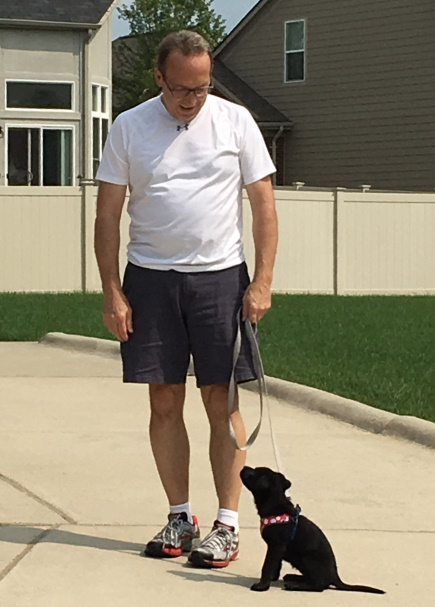Man’s Best Friend: School of Social Work alum is now a top dog at Michigan Humane
Doug Plant, a Wayne State University School of Social Work MSW graduate, has fond memories of family pets.
“Dogs and cats were always part of my family, and I have my father to thank for my understanding the value of rescuing animals. My dad would bring home stray dogs that needed help,” said Plant.

Plant served in executive roles at many nonprofit organizations over the years, including the American Diabetes Association, Neighborhood Community Services, and the United Way for Southeastern Michigan. In 2017, he joined Michigan Humane as senior vice president and chief operating officer. Michigan Humane is Michigan’s largest animal welfare organization, serving approximately 25,000 animals and over 100,000 pet owners.
One of his goals was to connect Michigan Humane with communities to discuss how they could help neighborhoods become safer, healthier, and economically stable. Plant leveraged his MSW and community relationships to build partnerships focused on how animals could assist organizations with their mission. And although he had no formal animal welfare experience, he was surrounded by animal experts who helped him strengthen his team and mission.
Long-lasting impact of Wayne State
During his two years at WSU, Plant built lasting relationships with fellow students and professors, including Phyllis Vroom, who nominated him for WSU School of Social Work Alumnus of the Year Award in 2008.
“The recognition I received was shared by the entire team who collaborated with me, and with those who came before me in getting 2-1-1 (a United Way initiative) off the ground. Dr. Vroom’s recognition and support of this program was instrumental in its launch.”
Plant credits his SSW clinical practicum mentors and professors with providing him with “a well-rounded understanding of his work at an individual, family, and systems level.”
Field of veterinary social work is growing
According to a 2022 study conducted by the American Pet Products Association, 70 percent of U.S. households, or about 90.5 million families, own a pet, up from 67 percent in 2019. During the pandemic, one in five American households acquired a cat or dog (American Society for the Prevention of Cruelty to Animals, 2021).
“Studies show that pets can reduce heart rate and blood pressure, encourage healthy activities such as daily walking, and be an important source of support for people who suffer from anxiety and depression,” said Plant.
Given these statistics, it’s no surprise that social workers are gravitating toward careers involving animal therapy.
“Veterinary social work and social workers within the animal welfare community bring a unique blend of talent to impact families with complex needs.”
Plant knows first-hand how pets can impact our lives.
“Every day I see how pets bring joy, love, and respect for humans and animals to the families we serve.”
School of Social Work partners with Michigan Humane
To help social workers connect with individuals and families and add to the stability of community, the School is forging a partnership with Michigan Humane.
This innovative approach to preventive care for families allows social workers to move from a ‘reactive’ outlook to one of prevention. Social workers work closely with families using the pet as an entre into the home and lives of those who may have additional needs.
Using an interprofessional care model, WSU Social Work students will work with Michigan Humane professionals including veterinarians and vet techs in community settings such as nursing homes and rehabilitation facilities to provide a holistic care approach. Students will receive specialized curriculum and training related to animal assisted intervention, including a course devoted entirely to this burgeoning field currently under development.
Stay tuned for future updates on this growing partnership.
Michigan Humane initiatives positively impact staff and community
Two new Michigan Humane programs spearheaded by Plant are making a difference. The first, a “Keeping Families Together” initiative, involves shifting from sheltering animals (intervention) to keeping animals in their homes (prevention). “Three years ago, we began providing care to families in need so they could keep their pets. Medical, behavioral, and basic needs are the primary reasons families struggle with keeping their pets. Our program provides these supports at little or no cost to families. In 2021, for the first time in history, we provided care for twice as many pets in the community than we did in the shelter.”
The second program, called “Navigator Express Training,” helps staff more effectively interact with the public. Taught by a licensed MSW and SSW field instructor, the training focuses on topics such as empathy, motivational interviewing, grief and loss, and problem solving. “The goal of this series is to provide my teams with tools to help families who are struggling no matter what the issues are.”
Fostering and volunteering are rewarding experiences

Rescuing and finding homes for animals is always a priority for Plant and Michigan Humane, and he’s “walking the walk” as the owner of two rescue dogs—Scout, a lab mix, and Marty, a “puggle,” or pug and beagle mix. “They keep me moving and cared for every day.”
And while adopting animals is a priority, fostering is just as important. “Fostering give families a sense of purpose and value to an animal without the long-term commitment.”
“Doug has a passion for helping families and has infused the human element into everything we do here at Michigan Humane. His leadership in our organization and in this community is inspiring,” said Matthew Pepper, president and CEO at Michigan Humane.
Shelter volunteers are always needed at Michigan Humane. “Whether it’s caring for animals in one of our shelters, participating in community events, or encouraging others to microchip and sterilize their pet, there are many ways to support our mission.” For more information about volunteer opportunities and other ways you can contribute, visit www.michiganhumane.org.
Author: Laura Hipshire, laurahipshire@wayne.edu